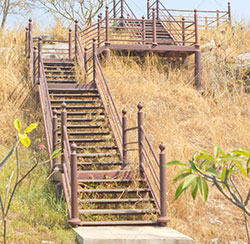Prefabricated Concrete Stair Treads

Concrete stair treads or precast concrete stair treads are best used for outdoor applications, particularly for used on elevated sections of swimming pool areas. These precast concrete stair treads or concrete stair treads can also be used on outdoor areas other than swimming pool areas. These prefab or precast stairs are tested using the most rigid procedures and can be installed in any environment.
These precast concrete stair treads may be installed as soon as the building has structural framings, the excavation of the foundation already backfilled, and the final grade near the entrance has already been laid out. Once the concrete stair treads are installed, people have a safe and permanent egress from inside and outside the structure.
The standard size of a concrete stair tread is 24 or 48 inches by 14 inches with thicknesses dependent on the tread profile. These edge profiles include bullnose, wedge, square, and dropped. The bullnose profile has a thickness of two inches. Meanwhile, the wedge, square, and dropped edge profiles have thicknesses of three inches.
These concrete stair treads come in custom designs and colors. There are endless design possibilities as these precast concrete stair treads come in various aggregate mixes and colors. The surfaces of these treads can be shot blasted or polished for more slip-resistant attributes. These stair treads are also mixed with crushed recycled granite particles, which not only add beauty to the steps. These granite particles also add durability and are environment-friendly alternatives.
These precast concrete stair treads also come with fiber reinforcements and rebars. These reinforcements give strength and more value to stair treads and pool coping. They can also be cut easily for customization. Aside from concrete and precast concrete, other materials used to make these stair treads are plastic (fiberglass-reinforced) over a lumber frame (treated) and wrought iron.
As prefabricated stair treads can be used immediately after installation, the installation can be set over a certain time interval and can be installed together with other construction tasks. What are the benefits of these concrete stair treads and precast concrete stair treads? These stairs need adherence to planned foundation and topography elevations for satisfactory egress. On areas where such precision is required, builders can benefit from the flexibility and affordability that such units provide. Thus, these precast concrete stairs are useful, not only in swimming pool areas, but also on areas that are uneven and require careful transition.
Prefabricated stairs benefit from the ability to build them to close tolerances in a factory environment and install them in just about any weather.
Pre-assembled stairways can be installed as soon as the structure is framed, the foundation excavation has been backfilled, and the final grade in proximity to the entrance has been established. Once stairs are in place, workers have a permanent, safe egress to and from the house.
Want to benefit from the same efficiencies, precision, and affordability gained by buying your interior stair(s) from a prefabricator? Well, prefabricated exterior stairways are becoming increasingly available in a broad range of materials, configurations, and designs. Units feature easy setup and can include features like integral rails, landing platforms, and various entry configurations. Treads can be ordered in lengths from 24″ to 48″.
Materials available range from fiberglass reinforced plastic over a treated lumber frame to pre-cast concrete to wrought iron. The opportunity to cast or assemble a unit in a controlled factory environment presents economies that allow concrete stair treads to compete handily with the costs of custom built stairs. Because a prefabricated unit can be used as soon as it is secured in place, unlike site built concrete stair treads, installation can be scheduled over a wider time interval and concurrently with other activities.
Ease of Implementation
Most entrances that can be accessed with site built stairways can also accommodate prefabricated units. Many of the manufacturers deliver with a vehicle capable of moving the unit into place, so driving access to the location is all that is needed. The manufacturer will recommend the method of securing the unit in place and whether a footing, excavation, or stoop ledge at the foundation wall is required.
Initial Cost
Prefabricated stairs can be priced as low as $170 for a three tread (32”), 4 riser, and handrail one side version to $850 for a precast concrete unit with a 48” deep landing to $1,500 or more for a metal 8’ metal spiral staircase with handrail.
Installation
Some units will weigh enough to require a crane for placement in an excavation or on top of a footing. Others may only require a hard surface, such as a 4” slab. Either way, planning that is not required for built-in-place stairs is required.
Benefits/Costs
Prefabricated Concrete Stair Treads require adherence to planned topography and foundation elevation(s) in order to provide satisfactory egress. On sites where this degree of precision is possible, builders can benefit from the affordability and flexibility that prefabricated units provide.
